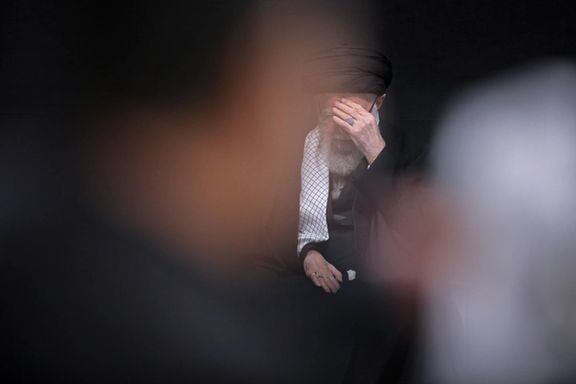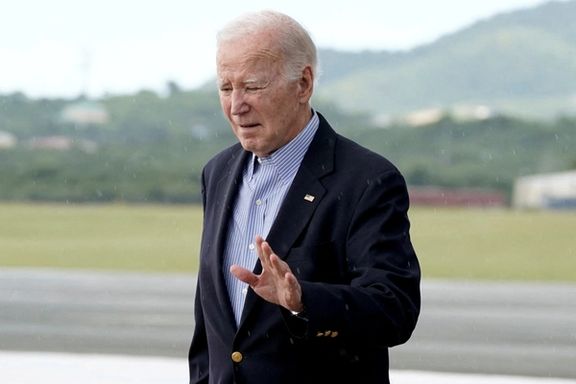Game Of Chicken In 2024? Former Officials Dare Khamenei To Blink!

At the end of 2023, former high-ranking Israeli and American officials warned of the consequences of not countering Iran's escalatory tactics in two Op-Eds.

At the end of 2023, former high-ranking Israeli and American officials warned of the consequences of not countering Iran's escalatory tactics in two Op-Eds.
Naftali Bennett, former Israeli Prime Minister, and John Bolton, former US National Security Advisor and veteran diplomat, have both called for closer cooperation between US and Israel, and military strikes at the heart the Islamic Republic of Iran’s military-industrial complex on Iranian soil.
Bennett and Bolton serve a warning to the world, particularly the current Biden administration, that Iran’s expanding nuclear program and the armed proxies of Iran’s Shia Imperium to destabilize the region. They argue that it is imperative for both the US and Israel to take direct military action against Iran. They emphasize that it is high time for US and Israel to destroy Iran’s Shia Imperium’s arsenal manufacturing infrastructure as well as any other infrastructure that help sustain their escalatory attacks against Israel, the US forces in the region, and the commercial maritime navigation.
Such a call for action is not the screaming of two traditional stalwarts of military action against Iran in a vacuum. Iran-backed militias’ attacks on US bases over the past ten weeks have escalated to such a degree that President Joe Biden had no choice but to order back-to-back “measured” retaliatory strikes against these armed proxies, first on 27 October. Nonetheless, even within Biden’s administration many believe that the President’s response has been less than adequate. In fact, credible reports do indicate that Pentagon top brass are frustrated with Biden’s failure to retaliate against the Iranian backed militia with vehemence and strength.

Biden’s “Strategic Patience” towards Iran
Since January 2021, Biden’s administration has pursued a policy of strategic patience towards the Tehran regime. Strategic patience is all too familiar a device of national security to Biden, his national security advisor, Jake Sullivan, and his CIA chief, William Burns. Under Barack Obama, they all served an administration that did particularly adhere to “strategic patience” vis-à-vis North Korea and made a point that Obama’s “strategic patience” was totally different from that of President Richard Nixon’s during the last phase of the Vietnam War. Yet, the Syrian civil war and the rise of ISIS in Iraq and the Levant as well as the Taliban’s successful resurgence under President Obama proved to be catastrophic.
Biden’s “strategic patience” is pentagon shape in dimensions. First, it has sought to disengage from the Middle East, i.e., withdraw troops and installations to the minimum possible, and respond to proxy attacks on the remaining US forces “proportionally”. Second, it has attempted at striking formal or informal agreements with rogue (state and non-state) actors to contain them, such as negotiations with Iran for an informal agreement over its nuclear program. Third, it seeks to incentivize regional allies to pursue a similar policy with the said actors. Fourth, it intends to closely tie regional US allies through security arrangements for self-preservation against rogue (state and non-state actors); and fifth, actively disregard failed attacks or provocative bravados by rouge state and non-state actors against US forces in the region. The aforementioned dimensions have been addressed under “Support De-Escalation and Integration in the Middle East” per “National Security Doctrine (October 2022, 42-43) in broad terms. However, the administration’s practice of “strategic patience” has achieved neither the terrorism prevention objective, nor has it attained by any degree the goals of “greater stability, prosperity, and opportunity for the people of the Middle East”.
The follies of Biden’s strategic patience towards the Iranian Shia Imperium only become abundantly clear when it is stacked against the staggering number of 151 attacks launched by Iran’s Shia Imperium against US installations in Iraq and Syria between January 2021 and 17 November 2023. Since Hamas’ attack of October 7, there have been more than 100 attacks by Iran backed proxies on US bases in Iraq and Syria. In return, the US retaliatory response does hardly amount to half a dozen strikes against the Iran-backed proxies.
Biden’s recent retaliation against Iran-backed proxies pales totally when compared with “the alleged Israeli targeted master stroke” that eliminated IRGC General Razi Mousavi in Syria on December 25. As to Mousavi’s value as a target one shall suffice to note that he was a right hand man to Qasem Soleimani, the IRGC top general and a mastermind of paramilitary and asymmetrical warfare, dispatched by the Trump administration in a drone attack in January 2020.
In fact, Biden’s response has been interpreted as a woefully inadequate gesture when viewed against the hundreds of brazen attacks launched against US troops over the past two years. Moreover, Iran’s proxies might have very well viewed Biden’s response as a feeble one when compared with another “alleged” December 29 Israeli airstrike that dispatched 11 senior IRGC commanders near Damascus International Airport. Whilst one may never know the type of intelligence that led Israel to such targeted attacks of such highly valuable Iranian assets, one can fairly speculate that the eliminated individuals did advise the same armed groups that have attacked US forces in Syria and Iraq since 7 October, not to mention Hamas, over the past few years. It is true that Trump administration’s killing of Soleimani did not stop Iran’s proxies from attacking US installations in the region, but it is also a fact that the Iran Shia Imperium has struck US forces with far more frequency under Biden than it ever did under Trump.

Iran’s Shia Imperium: The Matrix of Taking Advantage of Biden’s Strategic Patience
Iran-based analysts have been keenly following Biden’s staunch adherence to “strategic patience.” In fact, they have been developing different models to anticipate US reactions towards Iran’s provocations from early 2021. These models, found in the form of matrices published in Iranian “academic journals,” are significant as some have been penned by IRGC’s Imam Hossein military university graduates. All the said analysts have close connections to Iran’s foreign policy and national security decision making centers. On aggregate, these analyses place the pentagonal dimensions of Biden’s “strategic patience” at the core of their projections and seek to predict the trajectory of US-Iran “relations” until January 2025. Though almost all the said studies were published between 2021 and 2022, their proposed matrices do at once count on Biden administration’s commitment to “tension de-escalation with Iran” (strategic patience), its determination to arrive at some informal agreement over Iran’s nuclear program, and its focus to contain China.
Interestingly, they all believe, in so many words of course, that Iran Shia Imperium can prove itself useful to China and Russia by distracting US and its allies from theatres such as Ukraine and the South China Sea where Russia and China find themselves the target of increased pressure from the US and its allies. The papers are certainly “ambiguous” as to how this service can be rendered but it is hard to imagine absent of military skirmishes by Iran’s armed proxies any such distraction could have been given material effect.
The Biden administration seems to have read the wrong tea leaves when it developed its national security doctrine. The Tehran regime has now achieved the highest “weaponizable” capacity in its nuclear enrichment program, with an arsenal of long range ballistic missiles and an appetite to develop warheads. The Tehran regime may have been very much undermined through the trifecta of domestic instability, collapsed economy, and US-Western sanctions, but it has resolutely dragged itself through all these troubles by seamless fusion of systematic repression at home, and supplying cheap oil to China. In effect, Khamenei’s regime is not exactly on its knees yet.
The recent “alleged” Israeli elimination of key IRGC commanders in the region is testimony to Israel’s belief that Iran Shia Imperium has done its utmost to take advantage of Biden’s “strategic patience”.
Despite Hamas’ protestations that it planned and implemented 7 October attacks on its own, the question of Khamenei and his IRGC top brass foreknowledge of Hamas attacks is practically irrelevant. First, the Iranian regime has been a major military patron of Hamas. Second, for all intents and purposes, Iran Shia Imperium has proven a worthy ally of China and Russia in distracting the Biden’s administration. The US has now built up a behemoth military presence in the region by the advent of Israel-Hamas War. To deploy an attack nuclear submarine, an assault air squadron and two nuclear aircraft carriers with their accompanying battle groups into the Eastern Mediterranean and the Persian Gulf regions, in addition to all other bases in Qatar and Bahrain, is no small feat. With no concrete action against the Iranian military-industrial complex, as counselled by Bolton and Bennett, such a deployment shall only reassure Khamenei and his IRGC top brass that America is all bark and no bite. They may indeed make good on their promise of revenging General Mousavi’s elimination in the new year, an act that will certainly raise the stakes to escalatory heights in the region.
In this ever-unfolding game of chicken between US and Israel, on the one hand, and Iran and its armed proxies, on the other hand, the question is who will blink first when the stakes truly rise. Lest we also forget Prime Minister Netanyahu’s promise that whenever Israel decides that the stakes are sufficiently high enough, it may very well turn its attention away from a debilitated Hamas to the ever present and clear threat of the most powerful arm of Iran’s Shia Imperium in the region: the Hezbollah of Lebanon.